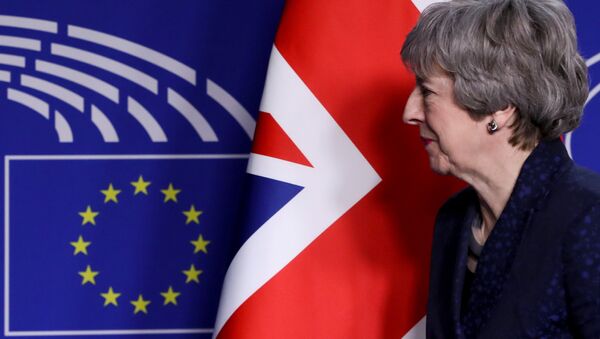Sputnik: Ongoing saga of Brexit. According to the UK's Finance Minister Philip Hammond, Britain will probably have to delay its departure — that's no surprise there, I suppose — if lawmakers reject the government's proposed divorce deal in a vote next week. I think it's on 12 March. What's your take on the likelihood of a no-deal Brexit? What about Brexit being postponed? I mean, for the life of me I cannot believe that the UK is going to go for a no-deal Brexit; it's just not going to happen, is it?
And, of course, the vote of next week has to be mentioned. And based on the last vote, which the government lost by a record 230 margin, it does look unlikely that Theresa May's deal that she is currently proposing is going to go through. And if that is rejected — and I think the government wants to avoid a no-deal — it's also been suggested that we're probably looking at a delay, which is again not an ideal situation and leads to a state of a sort of deadlock really.
READ MORE: UK is 'Trading Nation' & No Deal Brexit is 'Not Problem' — UKIP Scotland Leader
Sputnik: I'm in Moscow and my general feedback from the people in the UK is that they're so fed up with it, they just want it to be got on with; but I mean, obviously, that's not going to be the case. There's going to be a delay and maybe another delay, and there's a lot of concern that Brexit will just not be delivered. Is that your feeling? What's your personal feeling?
Ben Williams: I certainly agree with that. We're now in March and this date is coming up, this deadline [has been] on the horizon for some time. So, the end of this month is the day we originally were scheduled to leave the European Union. And there is a lot of anxiety; people aren't sure what's happening. There is a feeling, I think, amongst probably the majority of the population that people just want resolving, I think even people who wanted to remain have accepted now that we just need to solve it out one way or another.
And if it was a long delay of several months or even some people are saying a delay that works through a year if things don't progress, there could actually be some civil unrest; there have been people saying that there will be protests. We've already had some rioting, scuffles and disturbances in London; and there are some people, very much in favour of leaving the EU who would see a delay as some kind of betrayal of the vote of 2016. So, it's pretty tense I'd say and pretty uncertain, and there are a lot of anxieties on the people on both sides of the debate.
READ MORE: Taste of Brexit: Eurostar Travellers ‘Pawn in Game' as Paris Tightens Borders
Sputnik: What about a no-deal? I've been listening to Jacob Rees-Mogg and he is saying that under the WTO rules the country will continue to be able to trade, and a lot of it is scaremongering. He wants a no-trade deal to happen and he wants it to be concluded, but there's a lot of frostiness with regard to that. And, as I said, I think the government is just not going to be in a position to vote for that. Is a no-deal Brexit as bad and catastrophic as what the government and a lot of economic commentators are making it out to be? Is it going to be as bad as they say?
And if you listen to the experts, the businessmen or women, the heads of large corporations, people involved in the British Health Service, people involved in the food supply, farmers etc. — all of the leaders of these industries have spoken out recently and said there is a real danger of serious problems arriving. And I'm talking of it in terms of travel, the free movement of trade, food supplies, the broader economic British economy, supplies coming into our health service, national security issues which are a worry of course in an age of often heightened terrorist threat. We should listen to experts I would argue, and the experts are warning us of problems. [The reports are] very well saying that a no-deal isn't a problem, but the experts say it could be. And that is reflected in our MPs because the majority of British MPs, when it comes to a vote in the Houses of Parliament, will not support a no-deal; and that's the big reason why a no-deal probably won't happen because there's the majority of MPs who wouldn't support it.
The views expressed in this article are those of the speaker and do not necessarily reflect those of Sputnik.



